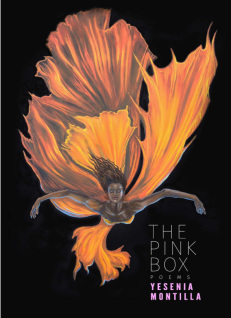Jose Angel Araguz's Blog, page 43
February 12, 2016
* refreshing via lisel mueller
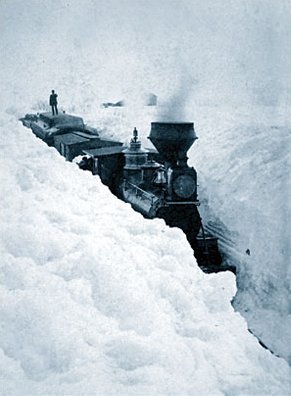 The Wikipedia page for Snow, under the heading “Effects on human society,” features the image here of a snow blockade in southern Minnesota in 1881. While awe is something I’ve always associated with snow – at least for the first ten minutes of a downfall, then I just get cranky – there’s something altogether new and refreshing experienced with this image. And here, I mean refreshing as in the “refresh” button on your computer screen that makes everything *new.*
The Wikipedia page for Snow, under the heading “Effects on human society,” features the image here of a snow blockade in southern Minnesota in 1881. While awe is something I’ve always associated with snow – at least for the first ten minutes of a downfall, then I just get cranky – there’s something altogether new and refreshing experienced with this image. And here, I mean refreshing as in the “refresh” button on your computer screen that makes everything *new.*
There’s the sheer daunting presence of the snow in the image, how there’s essentially more snow than train. There’s the fact the train continues to push forward, it’s engine stubborn and pushed. Then there’s the human figure standing on the train who maybe doesn’t believe what they see, as I don’t; or maybe does, as the above circumstance may have been an everyday occurence for trains.
I look at the lone figure and think: Well, there’s a poet. Not in the sense that I would impose any romantic notion upon them, but rather there’s a situation a poet seeks. Everyday snow and everyday train, but how often from this perspective?
This week’s poem by Lisel Mueller takes into a similar, refreshing perspective. The intimacy of the lyric charges the snow imagery with a tone that evokes both the lightness and light of snow. Snow becomes a way to see and feel ourselves anew.
Snow – Lisel Mueller*
Telephone poles relax their spines;
sidewalks go under. The nightly groans
of aging porches are put to sleep.
Mercy sponges the lips of stairs.
While we talk in the old concepts –
time that was, and things that are –
snow has leveled the stumps of the past
and the earth has a new language.
It is like the scene in which the girl
moves toward the hero
who has not yet said, “Come here.”
Come here, then. Every ditch
has been exalted. We are covered with stars.
Feel how light they are, our lives.
*
Happy lighting!
José
*from Alive Together: New and Selected Poems


February 8, 2016
* new review up at the volta blog
Just a quick note to share my latest review for The Volta Blog. This time around, I had the honor of reviewing fellow CantoMundo poet, Yesenia Montilla. It’s an inspiring book, one that adds to the conversation of the aesthetics and cultural understanding that come from engaging with one’s family history and traditions as well as one’s poetic traditions.
Also, two of Montilla’s poems – “Ode to a Dominican Breakfast” & “The Day I Realized We Were Black” – can be read at The Wide Shore.
See you Friday!
José


February 5, 2016
* sequencing with galway kinnell
As I work out of the echo of last week’s exams, I continue to have thoughts along the lines of fragmented narratives and ways of making use of what’s called in media res, which translates roughly as “into the middle of things.” It’s a phrase I picked up while reading Shakespeare: we first meet Romeo as he is in between relationships (I always forget that some serious moping opens up that famous play about love: kind of foreshadowing, no?).
I also see the term in media res as summing up how we understand ourselves. We are born into the middle of our parents’ lives; we read poems in the middle of different stages of our life; we eat, uhm, sandwiches in the middle of the day – and from these moments begin to cobble together the narrative pieces that make up who we are.
One of the ways this concept is worked with in lyric poetry is the sequence, and one of the great practitioners of which was Galway Kinnell, whose lines do the careful and exacting work of establishing moments and threading them together towards a greater whole.
Coming back to this week’s poem, there’s some sonic repetition (flop; feathers; flames) throughout the piece I hadn’t noticed before, and it’s telling how those sounds are absent from section 5. The difference, while subtle, does much to make the feeling of that section stand out against the rest. Each stanza, ultimately, plays image and moment against each other powerfully through such distinctions.
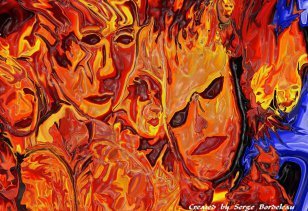
Another Night in the Ruins – Galway Kinnell
1
In the evening
haze darkening on the hills,
purple of the eternal,
a last bird crosses over,
‘flop flop,’ adoring
only the instant.
2
Nine years ago,
in a plane that rumbled all night
above the Atlantic,
I could see, lit up
by lightning bolts jumping out of it,
a thunderhead formed like the face
of my brother, looking down
on blue,
lightning-flashed moments of the Atlantic.
3
He used to tell me,
“What good is the day?
On some hill of despair
the bonfire
you kindle can light the great sky—
though it’s true, of course, to make it burn
you have to throw yourself in …”
4
Wind tears itself hollow
in the eaves of these ruins, ghost-flute
of snowdrifts
that build out there in the dark:
upside-down ravines
into which night sweeps
our cast wings, our ink-spattered feathers.
5
I listen.
I hear nothing. Only
the cow, the cow of such
hollowness, mooing
down the bones.
6
Is that a
rooster? He
thrashes in the snow
for a grain. Finds
it. Rips
it into
flames. Flaps. Crows.
Flames
bursting out of his brow.
7
How many nights must it take
one such as me to learn
that we aren’t, after all, made
from that bird that flies out of its ashes,
that for us
as we go up in flames, our one work
is
to open ourselves, to be
the flames?
***
Happy flames!
José


January 29, 2016
* in memory of francisco x. alarcón
The X in My Name – Francisco X. Alarcón
the poor
signature
of my illiterate
and peasant
self
giving away
all rights
in a deceiving
contract for life
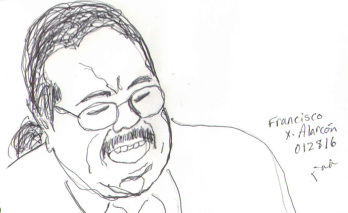 The death of Francisco X. Alarcón earlier this month has been on my mind as I wrap up my 3rd year reading and work through exams this week. Reviewing his book, Canto Hondo/Deep Song was a revelatory experience for me. Through following and engaging with Alarcón’s singular minimalist poetics, I learned a lot about precision with the line as well as how much weight can be carried via emphasis. But it was his commitment to representing and singing for those who suffered that moved me the most.
The death of Francisco X. Alarcón earlier this month has been on my mind as I wrap up my 3rd year reading and work through exams this week. Reviewing his book, Canto Hondo/Deep Song was a revelatory experience for me. Through following and engaging with Alarcón’s singular minimalist poetics, I learned a lot about precision with the line as well as how much weight can be carried via emphasis. But it was his commitment to representing and singing for those who suffered that moved me the most.
His death remains a constant source of conversation in the Latin@ literary community, mourning and celebration following each other in a complex cycle that would’ve pleased el maestro. As shown in the poem above, Alarcón was well aware of the contradictions to be worked with in being a Chicano; even an X in a name can be a metaphor for the multifaceted tension of identity and self.
I write this post the night before my final 3rd year exam. Diving into my own sense of tradition and identity in Latin@ poetics has been an emotional journey. I have had great community throughout – from my CantoMundistas, to readers of my poems and books, as well as those of you who stop and read these Influences. Thank you. Thank you as well to the great teachers I’ve had, in the classroom and on the page.
“Mexican” Is Not a Noun – Francisco X. Alarcón
to forty-six UC Santa Cruz students and
seven faculty arrested in Watsonville for
showing solidarity with two thousand
striking cannery workers who were mostly
Mexican women, October 27, 1985
“Mexican”
is not
a noun
or an
adjective
“Mexican”
is a life
long
low-paying
job
a check
mark on
a welfare
police
form
more than
a word
a nail in
the soul
but
it hurts
it points
it dreams
it offends
it cries
it moves
it strikes
it burns
just like
a verb
*
Happy verbing!
José
p.s. Here is Rigoberto González’s tribute to Alarcón.


January 22, 2016
* celebrating with sei shonagon & yahia lababidi
In celebration of the release of my digital chapbook, The Book of Flight (Essay Press), this week’s Influence will be focused on work that I feel is in spirit with the project.
 First up is Sei Shonagon, who I wrote about in October. I had reason to return to her lists in The Pillow Book recently, and continue to marvel at the surprise-charged prose:
First up is Sei Shonagon, who I wrote about in October. I had reason to return to her lists in The Pillow Book recently, and continue to marvel at the surprise-charged prose:
16. Things That Make One’s Heart Beat Faster
Sparrows feeding their young. To pass a place where babies are playing. To sleep in a room where some incense has been burnt. To notice that one’s elegant Chinese mirror has become a little cloudy. To see a gentleman stop his carriage before one’s gate and instruct his attendants to announce his arrival. To wash one’s hair, make one’s toilet, put on scented robes; even if not a soul sees one, these preparations still produce an inner pleasure.
It is night and one is expecting a visitor. Suddenly one is startled by the sound of raindrops, which the wind blows against the shutters.
The cumulative effect of sensory details is at turns charming and striking. It becomes a matter of where the writer leaves you: When the “wind blows against the shutters” it takes one’s breath as well as the narrative away.
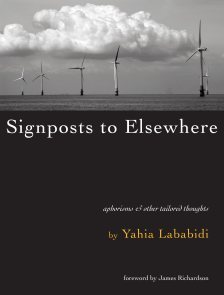 Another writer whose work has meant more and more to me in the past few months is Yahia Lababidi. Here’s a sample from his collection, Signposts to Elsewhere: aphorisms & other tailored thoughts:
Another writer whose work has meant more and more to me in the past few months is Yahia Lababidi. Here’s a sample from his collection, Signposts to Elsewhere: aphorisms & other tailored thoughts:
The personal made universal is art’s truth.
Impulses we attempt to strangle only develop stronger muscles.
The irony of the writer is that of a private person in a public profession.
Venom poisons most the people who carry it.
What I see as the “tailoring” of the aphorisms and thoughts in this collection is something akin to a fingerprint. Throughout, Lababidi does a great job of tempering the didactic and distant nature of the aphorism with a bit of down to earth humor and wisdom.
Here’s another sample:
Dreams: what get us through the night, and oftentimes the day.
Tattoo: graffiti on a masterpiece.
Disgust can be constructive as a spark igniting transformation.
It is not lovers who compose poetry, but Love.
This last line especially speaks to me about the nature of what it means to be a writer, that there is a purpose beyond ink on page at practice through us.
Thank you to everyone who has reached out with kind words about The Book of Flight (available for free online)! Thank you also to everyone who has shared their thoughts about Everything We Think We Hear! It’s been a big couple of months for me. Thank you for reading, y’all!
Happy tailoring!
José


January 18, 2016
* new online chapbook released!!!
“In the book of flight, plastic bags are brought in to do the work of clouds.
Dead leaves rest in the margins.
Grass clippings, eyelashes, fingernails: errata in the book of flight.”
(José Angel Araguz from The Book of Flight)
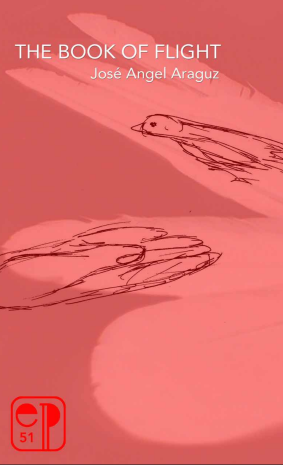
Happy to announce the release of my latest online chapbook The Book of Flight published by Essay Press! Read it free online or download the chap in PDF here.
The Book of Flight is one of twelve winners in Essay Press’s first Digital Chapbook Contest. For this contest, Essay Press asked 12 recent Essay authors each to select and introduce a manuscript extending and/or challenging the formal possibilities of prose. I am honored to have my manuscript selected and eloquently introduced by the innovative author Misha Pam Dick.
Here is a brief description of the chapbook:
“José Angel Araguz’s The Book of Flight is a chapbook of aphoristic, fragmentary writings in the style of Ramon Gomez de la Serna’s greguerías and Pablo Neruda’s The Book of Questions. Described by Misha Pam Dick as “a four-part microtreatise-poem. Like aphorisms that don’t preen, or fragments that don’t mourn,” The Book of Flight lives somewhere between the insight of haiku, the personal heat of tanka, and the everyday tone of a poet’s notebook.”
This project is especially meaningful to me as it represents the culmination of many of the ideas and insights I have followed and exercised throughout various notebooks and other projects over the past ten years. “Clock Ode” in Reasons (not) to Dance as well as “Zoot Suit Riot” and “Moth Season” in Everything We Think We Hear are good examples of precursors to the sensibility that is in full force in this project.
Please read and share this free chapbook and stay tuned for the other eleven selections from Essay Press!
Thanks to Andy Fitch, Maria Anderson, and Aimee Harrison for all the hard work in putting together the chapbook. Thanks toAndrea Schreiber for the cover art and Courtney Mandryk for the cover design. And an extra special thanks to Misha Pam Dick for selecting the manuscript and writing the introduction!
See you Friday!
José


January 15, 2016
* tejiendo roosters: a translation tale
Once upon a time, I was a young poet reading through an anthology of Latin American poetry when I came across a poem by João Cabral de Melo Neto that just blew me away. I wrote the poem down in a notebook – it was in Spanish, translated from the original Portuguese – to translate into English later, which I did, happy to be in conversation with the poem.
The thing is when I discovered this poem years ago, I had it in my head that it was made up of only one part, and so for me, the poem was only one section long. And this one section is lovely. See for yourself:
Weaving the Morning
– João Cabral de Melo Neto*
translated into English by José Angel Araguz
1
One rooster alone does not weave the morning:
he will always be working with other roosters.
One to pick up the cry that he
and throw it to another; another rooster
to pick up the cry of the previous rooster
and throw it to another; and other roosters
with many other roosters crossing
the sun-threads of their rooster cries,
so that the morning, made of a soft fabric,
goes on being woven among all roosters.
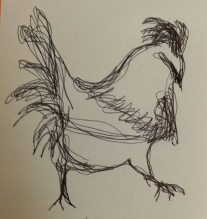
* gallo remembered *
Later, I rediscovered the poem and learned that the poet had written it with two sections, not just one. And what’s worse, that second, new (to me) section was kinda clunky (again, to me). Again, see for yourself:
2
And taking shape in this fabric, gathered,
stored and waiting where everyone will enter,
entertaining itself in the awning
(morning) sets down its frameless plans.
Morning, a canopy woven of such airy material
it rises by itself: a globe of light.
So there I was, mistaken and shaken. Was the poem I ran into in the anthology misprinted? Or had it been printed at the bottom of a page, and had younger me – floored and amazed by that first section – not turned the page when I copied it down? What else but poetry can have us slipping past ourselves like this?
There were also the questions of translation: Was the poem in its entirety a finer product in the original Portuguese? Should I consult other Spanish translations? What is a translation but a reaching into the material of memory, other’s and one’s own?
Now, my goal in sharing this story – well, not really story, more snapshots of poetic fumbling – is not to make a case against the second section, but to share the poem (it’s charm can withstand my fumbling). I also wanted to engage a bit with ideas of memory and enchantment (charm, enchantment: très magique) and how both work in specific ways in poetry. The way the roosters build off each other’s cries is much like the way one poem is answered by another, and how one memory is blurred and built upon by another. One reads and writes, in order to read and write some more.
In a recent postcard exchange with Edward Vidaurre, I held onto my earlier enchantment as I wrote the first section of the poem out. I figured, hey, the first section’s the best part and there’s only so much room on a postcard for a poem plus my own meandering explanation at how I failed to remember the second section initially.
So, really, this is a tale of failure. Speaking of: As I prepared to write this blog post, I flipped through my sketchbook, remembering distinctly that I had sketched a rooster sometime in the past, had the image of it vividly in mind (see above).
Alas, when I found the image, it was no rooster:
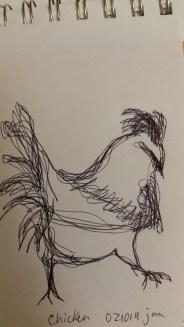
* mis-galloed *
Happy roostering!
Jose
*p.s. Here is the poem in the original Portuguese as well as the Spanish translation I worked from:
Tecendo a Manhã – João Cabral de Melo Neto (original)
Um galo sozinho não tece uma manhã:
ele precisará sempre de outros galos.
De um que apanhe esse grito que ele
e o lance a outro; de um outro galo
que apanhe o grito de um galo antes
e o lance a outro; e de outros galos
que com muitos outros galos se cruzem
os fios de sol de seus gritos de galo,
para que a manhã, desde uma teia tênue,
se vá tecendo, entre todos os galos.
E se encorpando em tela, entre todos,
se erguendo tenda, onde entrem todos,
se entretendendo para todos, no toldo
(a manhã) que plana livre de armação.
A manhã, toldo de um tecido tão aéreo
que, tecido, se eleva por si: luz balão.
*
Tejiendo la mañana –
João Cabral de Melo Neto
translated into Spanish by José Antonio Montano
1
Un gallo solo no teje una mañana:
precisará siempre de otros gallos.
De uno que recoja el grito que él
y lo lance a otro; de otro gallo
que recoja el grito del gallo anterior
y lo lance a otro; y de otros gallos
que con otros muchos gallos se crucen
los hilos de sol de sus gritos de gallo,
para que la mañana, con una tela tenue,
vaya siendo tejida, entre todos los gallos.
2
Y tomando cuerpo en tela, entre todos,
erigiéndose en tienda, donde entren todos,
entretendiéndose para todos, en el toldo
(la mañana) que planea libre de armazón.
La mañana, toldo de un tejido tan aéreo
que, tejido, se eleva de por sí: luz globo.


January 11, 2016
* new work up at Qu & Theodate
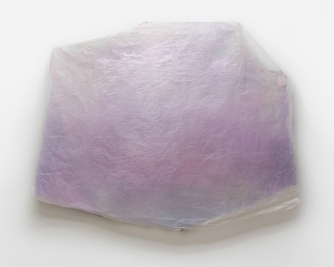
“Evening” by Claire Falkenberg, cover art on Qu: a literary magazine Issue 3
Just a quick note to announce the release of Qu: a literary magazine Issue 3 which includes my poems “Engrossed” and “Tourist.”
This issue also includes some fine work, including knockout poems by Jacqueline Balderrama and Amy Marengo. Check out the issue here.
*
Also, I’m happy to share that I have three poems up in the latest Thedoate: “Longing,” “Gods and Goddesses,” & “Widow.” Including in the issue are Billy Collins, Kim Bridgford, and John Gribble among others. Check out the issue here.
See you Friday!
Jose


January 8, 2016
* dusting with dilruba ahmed & francisco quevedo
Snake Oil, Snake Bite – Dilruba Ahmed
They staunched the wound with a stone.
They drew blue venom from his blood
……….until there was none.
When his veins ran true his face remained
lifeless and all the mothers of the village
wept and pounded their chests until the sky
………..had little choice
but to grant their supplications. God made
………..the boy breathe again.
God breathes life into us, it is said,
only once. But this case was an exception.
God drew back in a giant gust and blew life into the boy
and like a stranded fish, he shuddered, oceanless.
It was true: the boy lived.
He lived for a very long time. The toxins
were an oil slick: contaminated, cleaned.
But just as soon as the women
kissed redness back into his cheeks
the boy began to die again.
He continued to die for the rest of his life.
The dying took place slowly, sweetly.
The dying took a very long time.
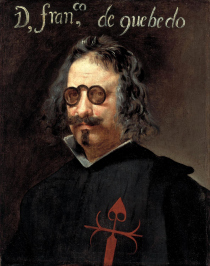
Francisco de Quevedo, my bespectacled friend above, was known for having a life philosophy which, at its core, believed that we begin dying the moment we are born. One could argue that this is simply a way of choosing a side in the old “is the glass half full/half empty” query. There’s a subtle, complicated optimism, though, to his statement, that is easy to miss. One gets a better sense of the man’s thoughts in another quote:
Polvo serán, mas polvo enamorado.
Which roughly translates to: Dust be , but dust in love .
2015 was a tough year. About midway through, I found myself in the hospital due to some stomach issues. Having one’s life fall from them, even for a moment, is humbling. On the ground, in the dust, humbling. But then, as this week’s poem describes, there is the “giant gust” that brings us back to life, and returns us to our dying. Ahmed’s poem wins me over each time I read it for the way life is evoked in several actions, and moves from reality and rite to a hopeful, complicated reconciliation.
As the first week of the new year ends, I want to wish all of you who pay me the compliment of visiting this blog and visiting my poems the best in all aspects of your lives. I wish you another year of being dust, but dust in love.
Happy Quevedo-ing!
José
p.s. Stay tuned next week for the release of a new online project!


January 1, 2016
* 2015 end of year reading
Time once again for my end of year reading – which technically this year is more of a first of year reading – so however you feel fit to see it, please do. See it, that is.
I have been busy the past 3 weeks reading through the last leg of my reading list for my exams later this month. Here be the last stack(s) of books:
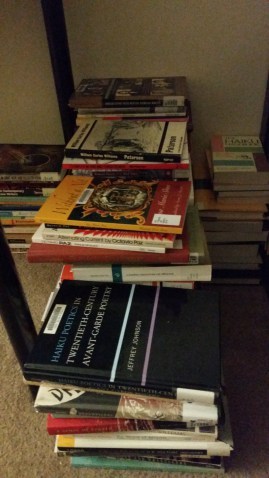
If you’re like me and can’t see a photo of books without scanning to see who’s in the “crowd,” here’s a short list of what’s visible:
a book on haiku poetics; Borges’ Dreamtigers; A Sense of Regard (essays); By Word of Mouth (William Carlos Williams’ translations); Pablo Neruda and the U.S. Culture Industry; Without a Net by Ana Maria Shua; two books by Octavio Paz; Rigoberto Gonzalez’s Butterfly Boy (sans-book jacket, esta frio!); La Otra Mirada (microrrelato anthology); William Carlos William’s Paterson; Complete Works and Other Stories by Augosto Monterroso; Takuboku Ishikawa’s Romaji Diary/Sad Toys; Conversations with Mexican American Writers (interviews); Sandra Cisneros’ My Wicked, Wicked Ways; Rosa Alcalá’s Undocumentaries; Pat Mora’s Aunt Carmen’s Book of Practical Saints; & flanking the stacks: William J. Higginson’s The Haiku Handbook; Juan Felipe Herrera’s Half of the World in Light.
***
I took a break last week to record a few readings from Everything We Think We Hear by the Ohio river after eating our annual Christmas Eve Eli’s BBQ. Below is the video and text of “Jalapeños” and “Holiday Policy.”
Looking back, I realize these two poems are a good example of the kind of range I was going for in this collection. “Jalapeños”is a kind of homage not only to the chili pepper but also to Yeats, family, and Corpus Christi, all refracted via nonlinear, lyrical momentum. “Holiday Policy,” on the other hand, is driven by a more linear narrative, but is subverted in its story within a story framework.
Enjoy!
*
Jalapeños
Pickled, you gleam, a smile hiding its teeth. Photo negative from Picture Day, money missing from my pockets, that smile. I can live without money; without food, I’m useless. Hunger is a tide: I walk down when it is low and see more. Over time, you’ve taught me to fashion sensibilities after what I can tolerate. When I am old and gray, and have eaten enough, I will tolerate everyone. When your darkness first cracked, did everyone go silent as you spilled out your many, tiny moons? And did he think himself a sky, the first to place your moons upon his tongue? Or was it only later, after biting into your body, thinking his own body turned water, that the first looked down and found, piled in his hand, the dunes of ellipsis you keep inside? You are commas, keep each bite separate. You are semicolons, a tip of the hat to greet the day. Shape suggestive of the J in my name. Shape suggestive, period. My aunt threatening with you if I ever cussed. Sting of I should’ve known better than to. Without you, I am useless. Corpus Christi Bay begins to glisten with you. You keep riding on the color of the waves, mocking, many and mocking. Family pickled. Family sharp with vinegar. Family broken with bites. Hunger is a tide: when it is high, I remember I cannot swim. Through skin and seed, my filthy existence resumes, after the sting.
Holiday Policy
My friend, who with his white beard and wide chest looks like Santa Claus, tells me of working at a liquor store and having to take polaroids of people paying with a check. He did this when he was my age, but because I am my age, my friend becomes Santa with a camera and nametag, standing as straight as steel bars on windows, watching me buy my liquor. He laughs telling the story, but the Santa whose eyes are hard on me is silent. Under white eyebrows, I see myself already doubled, following the motions of the story: white flash, pen collapsing on the counter, bottles pointing fingers from brown paper bags, fluorescence hum below the words: Holiday policy. The photo hangs like a tongue out of the camera’s mouth, my face slowly appearing from gray-white to a grainy, blurred reflection. It was enough to put cash in their pockets, as if it had been there all along, says my friend in the story, who himself dissolves into the friend in the room, grown quiet, as if he could hear himself speaking in the memory I would later have of him after he died, and disappointed that there isn’t more to him than stories like this one.
*
Happy policying!
Jose
P.S. Check out my Instagram account (joseangelaraguz) for two more shorter readings!



